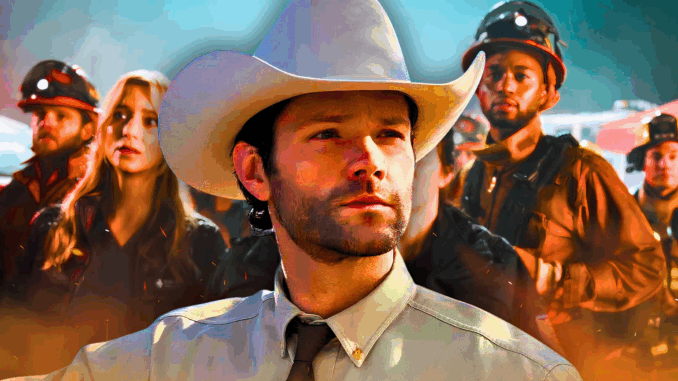
The loss of Vince Leone in the Season 4 premiere of Fire Country was an emotional and narrative earthquake. Vince, played by the incredibly popular Billy Burke, was not just the Battalion Chief of Station 42; he was the Leone family patriarch, the steadfast husband to Sharon (Diane Farr), and the moral compass for his troubled son, Bode (Max Thieriot). His death was a monumental choice, and showrunner Tia Napolitano was clear about the creative rationale behind the heartbreaking decision.
🚒 Honoring the Authentic Stakes of Firefighting
The most prominent reason Napolitano cited for the decision was the commitment to authenticity in portraying the lives of wildland firefighters. Fire Country is a show about a dangerous, high-risk profession, and until this point, no major character had paid the ultimate price.
“The truth is, firefighters risk their lives to do their jobs. That’s just the truth of it,” Napolitano told press. “And honoring that authenticity, we have always weighed the possibility of going there, and Season 4, it felt like it was time to do something fresh.”
For a show dedicated to these real-life heroes, avoiding the ultimate consequence felt, in a way, untrue to the job itself. Vince’s death serves as a brutal reminder that no amount of experience, love, or heroism can fully guard against the inherent dangers of running into the fire. The moment, which saw Vince sacrificing himself while saving others during the Zabel Ridge fire, ensures that his final act was one of pure, heroic sacrifice—a fitting end for the character he was.
SEO Keywords: authenticity firefighting show, Vince Leone death creative decision, risk real-life heroes
🪜 Forcing Growth for Bode Leone
Vince Leone’s biggest role was as the emotional center of the series, especially for his son, Bode. Their relationship—complicated by Bode’s incarceration, redemption journey, and Vince’s own complicated past—was a foundational pillar of the show. With Vince gone, Bode is forced to mature, professionally and personally, in ways the narrative couldn’t have achieved otherwise.
The Mentorship Void
Vince was Bode’s primary mentor, his staunchest advocate, and the one person who always saw the good in him. Napolitano explained that the loss is designed to push the next generation to “level up.”
- Bode’s Crisis: Vince’s death immediately plunges Bode into a fresh crisis of grief and temptation, testing his sobriety and his commitment to being a firefighter. Without his father’s constant presence and guidance, Bode must now prove that his redemption is internal and lasting, not just reliant on his dad’s support.
- Professional Advancement: The absence of the Battalion Chief creates a competitive void at Station 42, sparking new rivalries (particularly with Jake) and motivating Bode to “blast through his professional accomplishments” as he works to honor his father’s legacy.
Vince’s death is essentially the ultimate catalyst for Bode’s character growth, forcing him out of his arrested development and challenging him to step into a new, more responsible role.
SEO Keywords: Bode Leone character growth season 4, Vince Leone death impact on Bode, Leone family patriarch
💔 Recentering the Show on the Wound of Grief
The death of Vince Leone allows Fire Country to return to the thematic core that launched the series: grief and loss.
In the pilot, the audience learned that the initial rift in the Leone family—which ultimately led to Bode’s criminal path—was the tragic death of Vince and Sharon’s daughter, Riley. While Riley’s death was central to the family’s backstory, it was a loss the audience hadn’t directly experienced.
According to Napolitano, losing Vince in the Season 4 premiere provided a parallel experience for both the characters and the viewers:
“The show started so rooted in the death of Riley. This is a loss that our audience can feel alongside of our people in present time. [It] felt like it was time to go there and shake things up in Season 4.”
Losing a character that the audience has spent three seasons getting to know and love is a communal experience of grief that makes the trauma immediate and palpable. It allows the show to explore the messy, complicated realities of mourning—from Sharon’s survivor’s guilt and denial to Bode’s explosive rage and self-doubt.
The Ripple Effect
The impact of Vince’s death is not just confined to the immediate Leone family.
- Sharon Leone’s Journey: Diane Farr (Sharon Leone) confirmed that her character will cycle through the five stages of grief throughout the season, a dynamic narrative choice that offers her fresh storylines beyond her supportive role as Vince’s wife.
- Manny’s New Role: Manny Perez is thrust into a more prominent paternal role for Bode and the crew, forced to step up as a mentor in the absence of the Station Chief.
- Station 42’s Future: The void in leadership and the arrival of a challenging new battalion chief, Brett Richards (Shawn Hatosy), radically alters the dynamics and structure of the entire firehouse, injecting new conflict and energy into the show.
The showrunner and cast emphasized that while the loss is profound, the season will “continue to honor” Vince and his legacy, ensuring that his memory guides the actions and choices of every character, even as “life moves on.” The decision, while brutal, was deemed essential to prevent the show from becoming creatively stagnant and to launch the remaining characters into their next, most challenging acts.